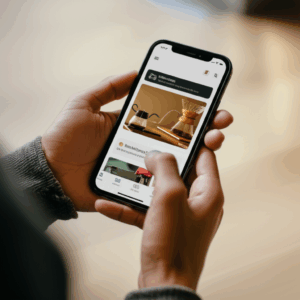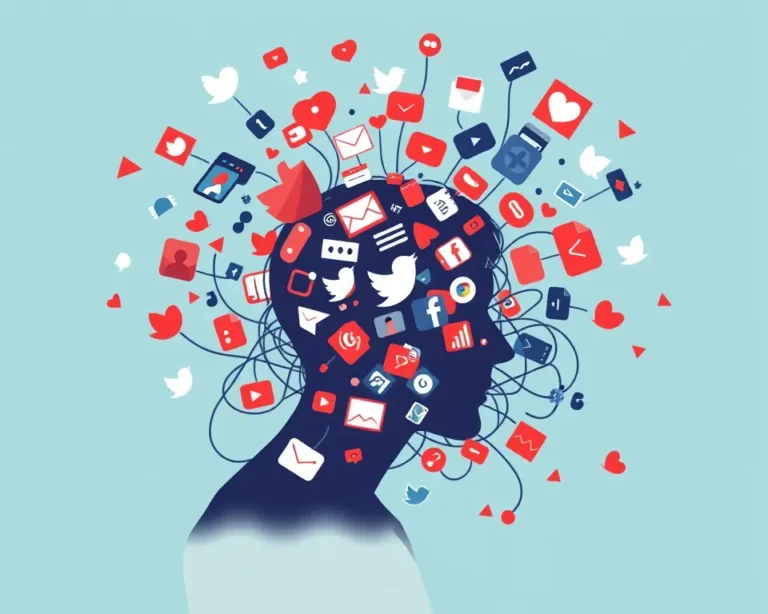In today’s digital world, social media has become an integral part of our lives, offering numerous benefits such as staying connected with loved ones, accessing information, and finding support communities. However, excessive social media use can negatively impact mental health, leading to anxiety, depression, loneliness, and decreased productivity. It’s crucial to take control of your social media feed and curate it in a way that protects your peace of mind. This article provides practical tips and strategies to help you create a healthier relationship with social media and safeguard your mental well-being.
The Double-Edged Sword of Social Media
Social media can be a double-edged sword. On one hand, it allows us to stay in touch with friends, discover inspiring content, and find support communities. On the other hand, excessive use or exposure to negative content can lead to comparison, low self-esteem, anxiety, and decreased focus.
Negative Impacts of Social Media on Mental Health
- Increased anxiety and depression: Studies have linked heavy social media use to an increased risk of depression and anxiety, especially in teens and young adults.
- Addictive nature: Social media can be addictive due to the release of dopamine, a “feel-good chemical” in the brain, when we receive likes or positive feedback.
- Cyberbullying: Social media platforms can be hotspots for cyberbullying, spreading hurtful rumors, lies, and abuse that can leave lasting emotional scars.
- Fear of missing out (FOMO): Seeing others’ “highlight reels” can increase feelings of dissatisfaction with our own lives and trigger FOMO.
- Worsened body image: Exposure to unrealistic beauty standards and curated images can lead to negative self-perception and body image issues, especially among teenage girls.
- Sleep problems: Checking social media before bed can disrupt sleep patterns, negatively impacting mental health.
- Social Isolation: Ironically, spending too much time on social media can lead to feelings of loneliness and isolation, exacerbating mental health problems.
Positive Effects of Social Media on Mental Health
Despite the potential negative impacts, social media can also have positive effects on mental health when used mindfully.
- Connection and Support: Social media can provide connections with others, which is incredibly important, especially for those who may feel isolated due to geographic location or marginalized identities.
- Access to Information and Resources: Social media provides access to mental health education, self-help resources, and coping strategies shared by mental health professionals and organizations.
- Inspiration and Motivation: Social media can be a source of inspiration through motivational quotes, stories of overcoming adversity, or content focused on personal growth.
Taking Control: Curating Your Social Media Feed
The key to protecting your peace on social media is to curate your feed intentionally. This involves being mindful of the content you consume and actively shaping your online experience to align with your values and mental health needs.
1. Conduct a Social Media Audit
A social media audit is a structured review of your social media presence to evaluate performance, identify gaps, and uncover opportunities. It helps you understand what’s working, what’s not, and what needs a complete rethink.
Steps for a Social Media Audit:
- List all active social media accounts: Start with an inventory of all your accounts across all major social media platforms.
- Check branding consistency: Ensure your profile information is accurate, updated, and consistent across platforms.
- Analyze key metrics and performance data: Dive into the data to get clear insights into what’s working and what’s not.
- Identify top-performing content and trends: Understand what posts work for your target audiences on each platform.
- Compare results to industry benchmarks and competitors: See how your metrics stack up against competitors in your space.
- Summarize findings and provide recommendations: Create an action plan to implement changes and track progress.
2. Unfollow or Mute Accounts That Trigger Negative Emotions
One of the most effective ways to curate your feed is to unfollow or mute accounts that make you feel bad about yourself. This includes:
- Influencers promoting unrealistic lifestyles: These accounts often showcase overly curated and perfectly decorated worlds, leading to feelings of inadequacy.
- Fitness gurus promising quick results: These accounts can create pressure to achieve unrealistic body standards and promote unhealthy behaviors.
- Accounts that consistently post negative or stressful content: These accounts can contribute to feelings of anxiety and overwhelm.
3. Follow Accounts That Inspire and Uplift You
Surround yourself with content that inspires, comforts, and uplifts you. This includes:
- Accounts that share positive and motivational content: These accounts can help you stay focused on your goals and maintain a positive outlook.
- Online communities that make you feel seen and represented: These communities can provide a sense of belonging and support.
- Funny accounts that help you destress: These accounts can offer a much-needed dose of humor and levity.
- Educational content, self-help resources, and coping strategies shared by mental health professionals and organizations: Accessing educational content can provide mental health support.
- Accounts that promote progress, not perfection: Look for accounts that promote realistic standards, as flawless content can create unrealistic expectations.
4. Be Mindful of the Algorithm
Social media algorithms are designed to personalize your experience by showing you content that aligns with your interests and preferences. While you can’t directly control these algorithms, you can influence them by:
- Engaging with content that aligns with your interests: Liking, commenting, and sharing posts that you enjoy signals to the algorithm what type of content you want to see more of.
- Following accounts that align with your interests: The more you interact with these accounts, the more similar content you’ll see.
- Customizing your feed preferences: Many platforms allow you to prioritize certain types of content or accounts.
- Unfollowing or muting accounts that no longer interest you: This helps the algorithm learn your current preferences.
- Searching for what you want, rather than passively yielding to suggestions: Algorithms track every click, so confirm their predictions about what you’ll like.
- Switching off suggested feeds and reverting to the old-fashioned, reverse-chronological order: Facebook, Instagram, and X all allow you to sort recent posts into this less addictive layout.
- Erasing your viewing history: Erasing your viewing history on YouTube will rid your feed of hyper-targeted material.
- Unlinking your various online accounts: Preventing algorithms from seeing your activity across platforms.
5. Set Boundaries and Practice Digital Detox
Establishing healthy social media habits is essential for protecting your mental health. This includes:
- Setting time limits: Use built-in tools or apps to track and limit your screen time.
- Scheduling social media breaks: Taking regular breaks can improve concentration, enhance mood, and promote healthier real-life relationships.
- Turning off non-essential notifications: This reduces the temptation to constantly check your phone.
- Avoiding social media before bed: The light from phones and other devices can disrupt your sleep.
- Practicing digital detox: Taking a day or more off social media can give your mind a chance to rest and recharge.
6. Engage in Real-Life Connections
Prioritizing face-to-face interactions with friends and family can help you stay grounded and avoid the negative effects of social media. Make an effort to:
- Schedule regular social activities: Plan outings with friends and family to strengthen your relationships.
- Engage in hobbies and activities that you enjoy: This can help you disconnect from social media and focus on the present moment.
- Practice mindfulness and self-compassion: Remind yourself of your accomplishments and worth, and avoid comparing yourself to others online.
7. Be a Responsible Social Media User
In addition to curating your own feed, it’s important to be a responsible social media user by:
- Avoiding spreading rumors or engaging in online harassment: Foster positive interactions by engaging in respectful and constructive discussions.
- Reporting inappropriate content: If you encounter content that violates community guidelines or promotes harmful behavior, report it to the platform.
- Being mindful of sharing personal information: Avoid sharing sensitive personal information such as your address, phone number, or financial details.
- Verifying information before sharing: Before sharing news articles or other content, take a moment to verify its accuracy and credibility.
Recognizing When It’s Time to Disconnect
It’s essential to recognize when social media is negatively impacting your mental health and take steps to disconnect. Signs that it’s time to take a break include:
- Feeling anxious, depressed, or lonely after using social media: Instead of helping to alleviate negative feelings, you feel worse.
- Comparing yourself to others and feeling inadequate: You experience inadequacy about your life or appearance.
- Spending excessive amounts of time on social media: You spend an excessive amount of time online.
- Suffering from sleep problems: You check social media last thing at night, first thing in the morning, or even when you wake up in the night.
The Benefits of a Social Media Detox
Taking a break from social media can offer numerous benefits for your mental and emotional well-being, including:
- Improved mental health and emotional well-being: Disconnecting from devices gives your mind a chance to rest and recharge.
- Increased focus and productivity: Reducing distractions allows you to concentrate on tasks and achieve your goals.
- Reconnection with the present moment: Taking a break from social media helps you to be more present and engaged in real-life experiences.
- Rediscovery of offline activities: Disconnecting from social media frees up time for hobbies, interests, and social interactions.
- Reassessment of digital habits and priorities: Taking a break allows you to reflect on your social media use and make healthier choices.
- Better sleep: Reducing screen time before bed can improve sleep quality and overall health.
Making Social Media Work for You
Social media should enhance your life, not drain it. By setting boundaries, curating your feed, and being intentional with your usage, you can create a healthier relationship with social media and protect your peace of mind. Remember, your mental well-being is worth it. You can transform your experience from one that is potentially harmful to one that is supportive and uplifting by consciously shaping your social media environment.







